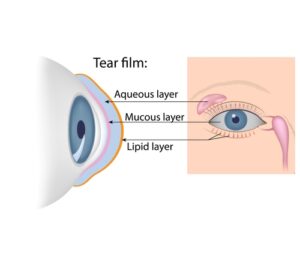Do your eyes feel dry, itchy, or irritated? Although these symptoms are uncomfortable, it’s more common than you think for your eyes to feel drier than they should sometimes.
When you don’t get enough water, or you’re in an extremely dry place, your eyes can struggle to produce tears or keep them on the surface of your eye. However, when your eyes are dry due to these temporary factors, they should feel better once you change your environment.
But if your eyes still feel dry or your symptoms persist without going away, that might be a sign that you could have dry eye syndrome. If your eyes are burning, stinging, and feel like they have grit in them, they may be too dry or suffering from the symptoms of dry eye syndrome.
These symptoms can worsen and cause permanent damage to your vision if left untreated. Keep reading to learn what dry eye syndrome is, how it can affect your eye health, and signs that you may have let the condition get out of control if you have it.
What is Dry Eye Syndrome?

If you have dry eyes, they may be due to environmental factors. However, your environment could worsen dry eye syndrome if you have it.
When symptoms persist even after correcting any apparent triggers, it’s often a sign that you could have dry eye syndrome. However, the only way to determine if you have the chronic eye condition is to receive a diagnosis from an eye care professional like your ophthalmologist at Williamson Eye Center.
Your chances of developing dry eye syndrome increase if you’re older, as well as if you’re a woman. Hormonal changes in women, like those caused by pregnancy or menopause, can trigger dry eye syndrome.
Dry eye syndrome is also associated with skin conditions that cause inflammation, like rosacea. Experiencing inflammation in and around the eyes can affect your tear composition.
Anything affecting your tear composition can make it harder for your tears to produce enough tears that are also high-quality to lubricate your eyes and deliver sufficient nutrients.
But how do you know when to see your eye doctor to talk about your dry eyes? Here are five signs that your dry eyes are out of control and it’s time to consider professional treatment:
1. Your Eyes Always Feel Dry

If your eyes feel like they are always dry, that can be a sign that you have dry eye syndrome. Your eyes may feel less irritated when you get enough water and keep your home and office humidified.
Still, if the irritation never completely disappears, your dry eyes may have a different underlying cause. It’s essential to see an eye doctor if your eyes are always dry so they can find out the reason. It could be due to dry eye syndrome or another eye condition.
2. You’re Experiencing Eye Pain
Dry eyes can be uncomfortable, but when your eyes constantly feel like they’re stinging and burning, it may be because you have a corneal abrasion or infection. Your eyes need moisture to stay healthy. When they are too dry, it becomes much easier to get an infection.
If you have an infected corneal abrasion, it can become a corneal ulcer, permanently affecting your vision. This is one reason why getting treatment for your dry eyes is vital before your symptoms become severe.
3. You Have Blurry Vision

If your vision is blurry because of dry eyes, you must seek treatment immediately. You may have a severe corneal abrasion or corneal ulcer.
You need medical intervention to prevent or treat any infection that could make the injury worse.
4. Your Eyes Produce a Lot of Water and Mucus
It may seem counter-intuitive, but your eyes can get more watery when they are too dry. This is because the water is made from reflexive tears trying to compensate for poor tear quality.
Your eyes may also produce a lot of mucus, another component in your tears. When you secrete a lot of mucus from your eyes, you can wake up in the morning with your eyelids effectively glued shut by dried mucus in your eyelashes.
If this ever happens to you, it’s probably a sign that your dry eyes are out of control, and you need to seek treatment.
5. Artificial Tears Aren’t Enough

One way to relieve dry eye symptoms is with over-the-counter lubricating eye drops or artificial tears. Artificial tears can moisturize your eyes and provide immediate relief from uncomfortable dry eye symptoms.
But when using artificial tears has little to no effect on your dry eyes, it can be a sign that you need to look into professional treatment.
Getting Treatment
When you come to Williamson Eye Center with dry eye symptoms, we first examine your eyes and assess your tear production and composition. Evaluating your tear production and composition allows us to diagnose you with dry eye syndrome, if you have it, and determine the root cause.
Once you’re diagnosed, we may recommend trying simple lifestyle changes. These changes may include consuming foods with more omega-3 fatty acids or practicing lid hygiene to control how much bacteria is on your eyelids to reduce inflammation.
After making these changes, we may recommend one of our professional treatments or prescribe eye drops. We may also recommend an in-office therapy like OptiLight.
OptiLight is a non-invasive, in-office, FDA-approved treatment that helps control inflammation. The therapy uses gentle light and heat to unblock oil glands, reduce inflammation, break up tears, and destroy abnormal blood vessels.
It also kills Demodex mites, which put a high bacterial load on your eyes when they overpopulate, leading to inflammation. OptiLight can give you lasting relief from dry eye syndrome by targeting all these dry eye triggers.

If your dry eyes are out of control, don’t wait any longer to get help. Make an appointment today at Williamson Eye Center in Baton Rouge, LA!



